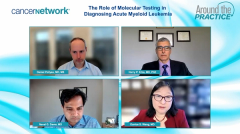
First-Line Treatment Options for AML With KMT2a Rearrangements
Daniel Pollyea, MD, MS, discusses first-line treatment options for patients with AML with KMT2a rearrangements.
Episodes in this series

Transcript:
Naval Daver, MD: Let me turn it here to Dan. Let’s take the other aberration, the KMT2A AML. [For a] young patient…[aged] 40 to 45 years, very fit [with] no FLT3 mutation, nothing else, no co-binding factor, what would you do? You have 7+3, you have FLAG-IDA + VEN [fludarabine, cytarabine, and filgrastim, and idarubicin] + VEN [venetoclax], you have FLAG-IDA + GO [ozogamicin], HMA + VEN [azacitidine or decitabine, and venetoclax], but he’s young fit. What would be your approach?
Daniel Pollyea, MD, MS: This is a tough one. And hopefully [there are] some answers on the horizon, some good answers on the horizon. At the moment, I have not found this patient’s disease biology to be all that responsive to venetoclax-based regimens, at least just a venetoclax + HMA type regimen. And …[as] Harry indicated that we have a lot to do in terms of making this subset have good long-term outcomes, they do typically have fairly average or expected responses to intensive chemotherapy. And whether those responses are durable or how you cure those patients, [which is a] different conversation, but at the moment, [for] a patient such as this, I would offer an intensive chemotherapy regimen. We have not offered these patients with intermediate- or poor-risk disease, because KMT2A [according to] the ELN [European LeukemiaNet] can be either [depending] on which translocation partner exists, but [patients with] intermediate- or poor-risk [disease] are not patients that we have offered gemtuzumab with intensive induction chemotherapy. This is a patient in our practice [who] would get intensive induction chemotherapy, ideally achieve a remission, and then move pretty expeditiously to transplant.
Naval Daver, MD: I think the 1 thing here for us at MD Anderson is the FLAG-IDA + VEN [regimen] has been doing quite well in these patients… . Surprisingly, we’re seeing very high response rates [and] molecular clearance. So, that’s where we were leaning. But again, we’re going to need randomized data. It’s going to be hard to get randomized data for these smaller subsets. We’re going to have to wait and see. But I agree with GO, although the pediatric groups have shown GO does have benefit in KMT2A. There was JCO [Journal of Clinical Oncology] paper from the COG [Children’s Oncology Group]. We actually had a lot of discussion about this. But I think given the good activity with FLAG-IDA + VEN, we’ve stuck with that.
Transcript is edited for clarity and readability.
Newsletter
Stay up to date on recent advances in the multidisciplinary approach to cancer.


































